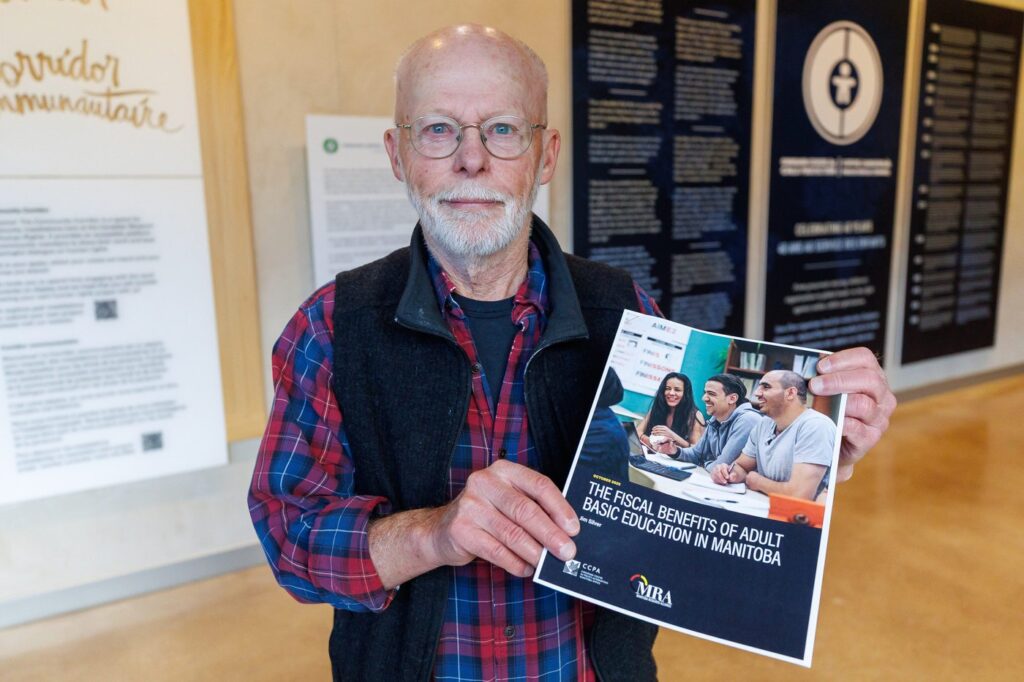A new report touts the economic impact — and untapped potential — of alternative schools that register mature students, adult newcomers and others who did not finish Grade 12.
“We ought to be radically re-imagining what education is,” said Jim Silver, professor emeritus of urban and inner-city studies at the University of Winnipeg.
“If you ask anybody, ‘What’s education?’ They’ll say, ‘K to 12 — elementary school and high school — and I guess, it’s also post-secondary, colleges and university.’”
As far as Silver is concerned, “basic adult education” should always be included in that definition.
The career researcher has appealed to multiple provincial governments to top up funding for these programs as part of their respective poverty-reduction plans.

Last week, in partnership with the Manitoba Research Alliance and the Canadian Centre for Policy Alternatives, he published a cost-benefit analysis.
Following approval from the U of W ethics committee, Silver’s latest survey was circulated to adults who had obtained a mature high-school diploma within the last five years.
Probe Research polled recent graduates of centres in Winnipeg, The Pas, Altona, Killarney and Boissevain between Jan. 20 and April 28.
Five out of six graduates reported they are either currently employed, continuing their education or both.
“It’s simply remarkable,” Silver said, noting that amounts to 83 per cent of them.
More than 60 per cent of the 63 individuals who were on employment and income assistance when they first enrolled said they no longer need it.
Silver found the related reduction in social assistance and all working graduates’ new taxes are the equivalent of $700,000 per year.
His conservative calculations do not reflect that some or all of the 42 respondents currently pursuing post-secondary training will also pay taxes upon entering the labour force.
Norma Zacharias, a 30-year-old high school student, heard these statistics at a report launch at the Canadian Museum for Human Rights.
“I feel very excited, but nervous at the same time,” Zacharias said about entering her final year of classes at Regional Connections Immigrant Services in Winkler.
A new mother, she is juggling childcare, evening shifts and completing her remaining credits to graduate.
Zacharias and her husband moved to Manitoba from Tamaulipas, Mexico, in 2022. Upon arrival, she was bilingual, but not in either of Canada’s official languages.
She now speaks fluent German and Spanish, and has a solid foundation in oral and written English.
“I think it (a high school education) will give me a better opportunity at my work… and see if I can do a little career,” she said about her rationale for enrolling in school while simultaneously working at a warehouse in southeastern Manitoba.
Given she grew up in a traditional Mennonite colony in Mexico, her early education was limited to reading, writing and basic arithmetic.
She’s now in her final year of high school in her new hometown, where she plans to raise a family — and possibly, homeschool her children.
There were roughly 100 people in attendance at the Adult Secondary Education Council’s 2025 conference.
Silver called on the crowd, made up of students and certified teachers, to help him rebrand their programs so the public sees adult learning centres as critical to grow the Manitoba economy.
The conference erupted into applause.
It was held at the Manitoba Teachers’ Society classrooms at the museum. Dozens of adult education teachers are members of MTS.
During his presentation, Silver urged English teachers to task their students with writing about the value of their alternative education programs.
These assignments can then be sent to Advanced Education Minister Reneé Cable and Premier Wab Kinew, he said.
“People pay attention when they get a bunch of letters,” Silver added.
Zacharias said she wants her infant daughter to have “a proper education,” like hers, even though it’s taken her mom longer to obtain than many other 30-somethings in Manitoba.
Nine in 10 of the 2025 study participants reported their children benefited from them attending and graduating from an adult learning centre.
“(A mature diploma) produces not only personal and family benefits, but also fiscal benefits accruing to the province,” the report said.
It concludes the Manitoba government breaks even within 10 years of funding adult basic education.
Silver’s survey has a margin of error of plus or minus 4.83 percentage points, or 19 times out of 20.
Graduates were incentivized to participate as they were told their name would be entered into a $100 prize draw at their centre upon submission of their completed survey.






